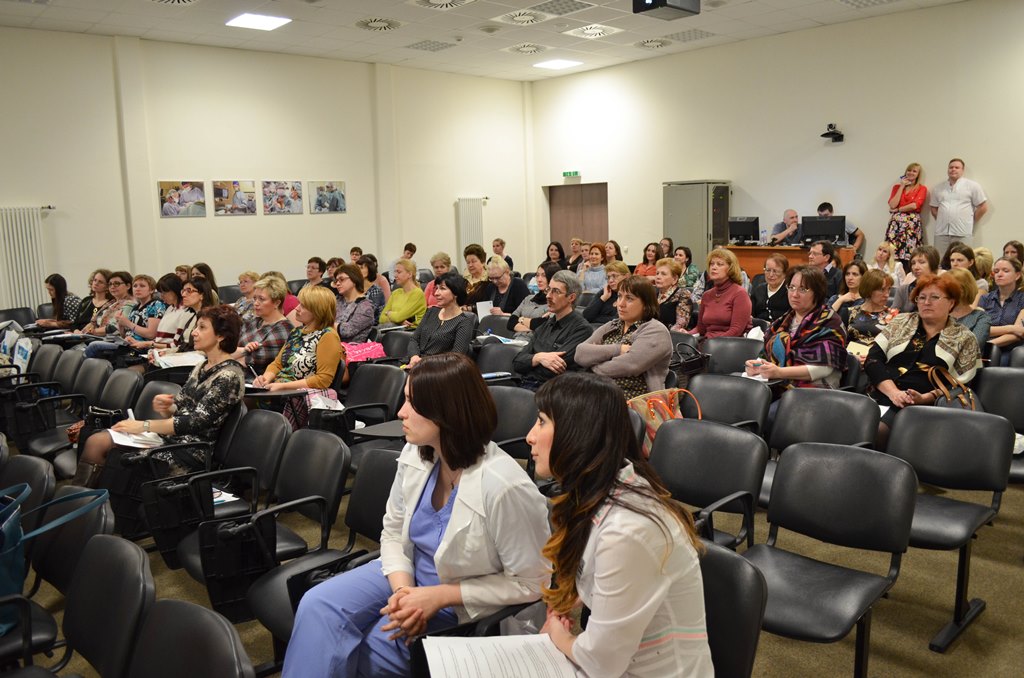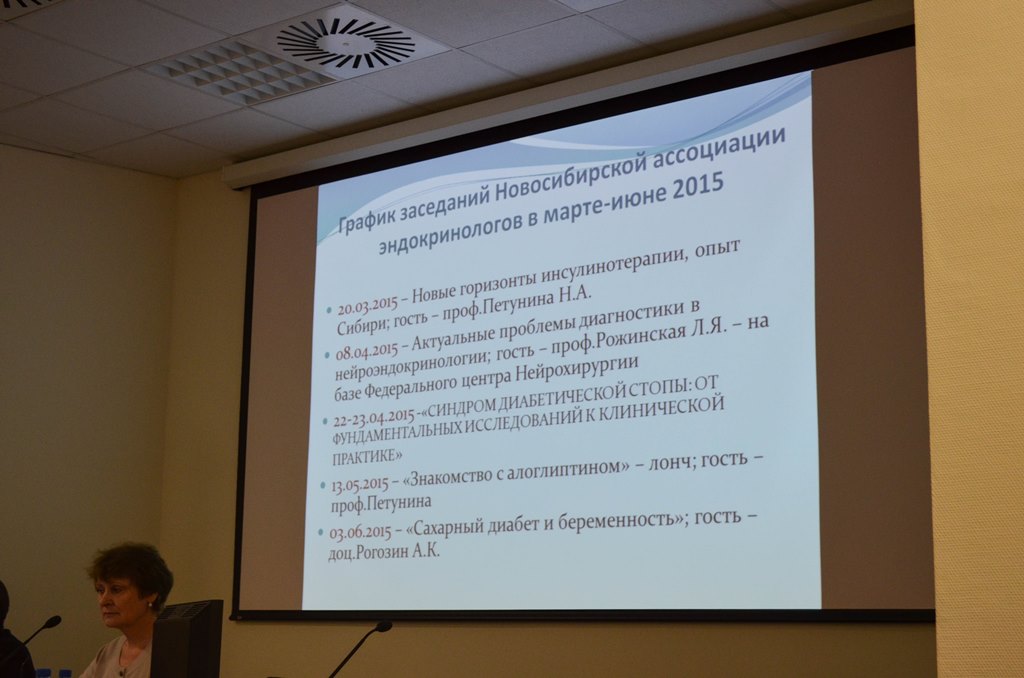Meeting of the Novosibirsk Endocrinologists Association.
Efficient operation of any medical institution is impossible without professional doctors. Medicine is developing quite rapidly, more and more new methods and technologies for the treatment of certain diseases appear every year, so that doctors should keep his eye on the ball and be aware of current events in the world of medicine.
There is no doubt that constant self-training plays an important role in this process, but do not underestimate the social events - various conventions, conferences, exhibitions and other events organized to gather together experts of a particular field of medicine to discuss topical issues and problems.
Such events give doctors a chance to share experiences with colleagues from different medical institutions not only from our country but also from all around the world. Doctors also can make useful contacts, which further lead to a long and fruitful collaboration.
In this section, we will cover upcoming and past events, the organizers or the participants of which are doctors of our Center. And reviews about participation in various activities will be available to read.
We hope that this information will be interesting for our colleagues and will be useful in their future work. We will be glad to see you, colleagues, on medical events!

On April 8, 2015 a regular meeting of the Novosibirsk Endocrinologists Association was held at the Center. Lyudmila Y. Rozhinskaya, head of the Neuroendocrinology and Osteopathy Department of Federal Endocrinology Research Center Moscow, MD, professor, doctor of the highest category was an invited speaker. Lyudmila A. Ruyatkina, MD, professor, Chairman of Novosibirsk Endocrinologists Society said welcome speech.
First report was presented by Jamil A. Rzaev, neurosurgeon, PhD, Head doctor of FNC. It was about “Surgical treatment of chiasmosellar area tumors”.
Doctor Rzaev spoke about various pathologies of chiasmosellar area, about historical aspect of surgical treatment of this area, mentioning both modern and remaining only as a reminder of the past kinds of surgical access. Jamil A. also explained eases and features of transnasal surgery in the context of anatomy.
Next report called “The features of MR-diagnosis of chiasmosellar area tumors” it was reported by Michael E. Amelin, radiologist, PhD, head of Radiodiagnosis division of FNC. He showed a wide variety of the shots of tumors of chiasmosellar area and focused on the features of their differential diagnosis. Most attention has been paid to the pituitary adenoma - a constant dispute between endocrinologists and radiologists.
The main objective of the report “Endoscopic removal of pituitary adenomas: our experience” of Ekaterina V. Gormolysova, neurosurgeon of Oncology department, was to show the advantages of endoscopic technique before microsurgery (minimal trauma, good visualization, the ability to remove hard-to-get-to adenomas). Ekaterina V. also gave details about the practice of follow-up of patients in the Federal Neurosurgical Center.
Next report called “Surgery of pituitary adenomas. Endocrinologists view” Ani R. Karapetyan, endocrinologist of Polyclinic division of FNC presented this report. Ani R. described the structure of patients with pituitary adenomas, operated in FNC, the possibility and frequency of complications such as postoperative, and evolved as a result of the lack of treatment. It was demonstrated outcomes of surgical treatment of patients with hormonally active and inactive pituitary adenomas and illustrated clinical cases of FNC.
The lecture “Hormonally active pituitary adenomas: diagnosis, indications for surgery, postoperative management” of Lyudmila Y. Rozhenskaya became the final. It was about prolactinomas, somatotropinomas, kortikotropinomas, tireotropinomas and gonadotropinomas..
Each disease was considered separately. For example, acromegaly (somatotropinoma) - heavy neuroendocrine disorder caused by chronic overproduction of growth hormone in individuals with completed physiological growth. The mortality rate among patients with acromegaly is more than 10 times greater than mortality rate in the control population. Without treatment, about 50% of patients die before the age of 50 years, but the timely adequate treatment reduces mortality rate 2-5 times.
The criteria for the diagnosis of acromegaly include:
• The clinical picture;
• The presence of micro or macro pituitary adenomas;
• IGF-1 over the age limit of normal sexual-age values;
• STH during glucose tolerance test not suppressed below 1 ng / ml (2.7 mU / L).
There are 3 main methods of treatment of acromegaly:
• Surgical (transcranial and transsphenoidal adenomectomy);
• Medical (somatostatin analogues, dopamine agonists, growth hormone receptor antagonists);
• Radiation therapy (external gamma-therapy, stereotactic radiosurgery).
The main factors determining the choice of treatment - a state of view, the size and nature of growth of adenoma, the level of growth hormone and IGF-1, the patient's age, presence of comorbid somatic disorders and desire of the patient.
Lyudmila Y. told about postoperative management:
On 1-2nd day assessment of suprarenal glands function should take place (cortisol and ACTH) and function of pituitary gland posterior lobe (sodium daily monitoring, blood osmolarity and diuresis).
On 5 to 7th day assessment estimation of STH during glucose tolerance test or 5 peak points of STH without glucose load – for estimation of surgical treatment efficiency.
When discharge from hospital if there no target suppression of STH – then medical treatment of acromegaly. In 3 and 6 months MRI should be repeated, and if there procedive and acromegaly is active during adequate therapy – decision for next operation or radiosurgery should be done, according to histology and immunogistochemical tests.
This lecture was informative and interesting for all the guests.
Past event allowed endocrinologists and neurosurgeons to share knowledge about chiasmosellar area tumor, expand understanding of the treatment of various diseases.
One of the main conclusions of the meeting was the fact that achieving the best results in the treatment of many endocrinological diseases is possible only with the close cooperation of endocrinologists and neurosurgeons, the basis for which such meetings create.
Speech of Lyudmila Rozhinskaya.
Speech of Lyudmila Ruyatkina.
Speech of Jamil Rzaev.
Speech of Michael Amelin.
Speech of Ekaterina Gormolysova.
Speech of Ani Karapetyan.

Schedule of upcoming events of the Novosibirsk Endocrinologists Association.









